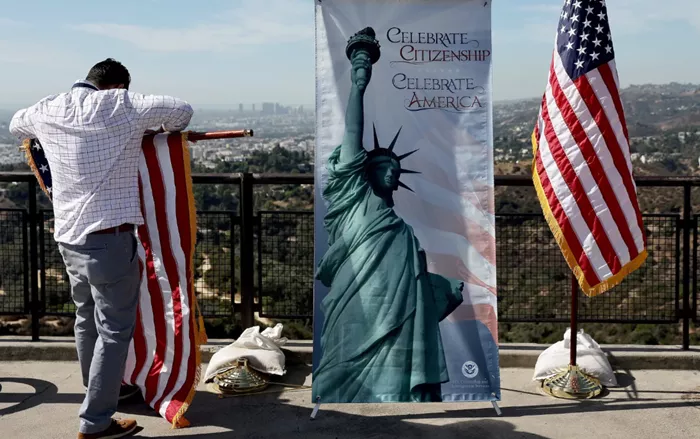Jackson Voltaire, a pastor who leads a fellowship of 255 Haitian Baptist churches in Florida, offered a personal blessing for then-President-elect Donald Trump the day after the 2020 election. However, Voltaire also met with church leaders worried about the potential impact of Trump’s policies on the legal status of Haitian immigrants in the U.S.
“We may tell people not to worry, but for many, there is reason to be concerned,” Voltaire said. “But when we focus on Jesus, our worries begin to fade. God’s promises offer a strength and comfort greater than fear.”
Trump’s campaign focused heavily on mass deportations, pledging to remove millions of undocumented immigrants from the U.S., including Haitians. His platform included a promise to carry out “the largest deportation operation in American history.”
Although Trump highlighted the need to address violent crime associated with undocumented immigrants, he also proposed ending legal immigration programs, such as one that provides Temporary Protected Status (TPS) to Haitians. TPS is a program that allows individuals from countries experiencing conflict or disaster to live and work in the U.S. temporarily. Trump unsuccessfully tried to end the program during his first term and has signaled his intention to do so again.
Haiti, struggling with a dysfunctional government and widespread gang violence, presents significant challenges for deportation, making any mass removals complicated. Voltaire, reflecting on the plight of Haitians, prayed not only for Trump’s blessings upon the U.S., but also for a change in Haiti’s political climate, so that people would no longer need to flee their homeland for safety in America.
During Trump’s first term, deportation numbers did not significantly differ from those under the Biden administration, and the Obama administration still holds the record for the highest number of deportations in a single year. However, Trump has proposed more drastic measures for deportation, such as deploying the National Guard to arrest undocumented immigrants. He often referenced the Eisenhower-era “Operation Wetback,” in which federal and local authorities conducted mass deportation raids, some of which resulted in the deportation of U.S. citizens.
Despite his plans, experts question whether Congress will approve the necessary funding for such a large-scale operation, with estimates suggesting the cost could reach $315 billion.
Matthew Soerens, head of advocacy at World Relief, a refugee resettlement organization, noted that while deportations targeting criminals would be widely supported, deportations of otherwise sympathetic individuals are a more contentious issue. “I think we will see an increase in deportations of people who don’t deserve to be deported,” Soerens said.
Evangelical Christians, who largely supported Trump during the election, hold diverse views on immigration. Traditionally, many evangelicals favor compassion for immigrants, supporting legal status for “Dreamers” (undocumented immigrants brought to the U.S. as children) and opposing family separations. However, some have shifted towards concerns about immigrants being an economic burden.
Faith-based organizations are hopeful that they can appeal to Trump’s professed support for persecuted Christians and his commitment to legal immigration. “We will urge the administration to recognize the value that immigrants and refugees bring to this nation,” said Krish O’Mara Vignarajah, president of the refugee resettlement agency, Global Refuge.
The Latino evangelical community is also deeply concerned about the impact of mass deportation. While Latino evangelicals tend to vote based on social issues like abortion, a significant portion of them, especially those from immigrant families, are worried about the effect of such policies on their communities.
Gabriel Salguero, president of the National Latino Evangelical Coalition, expressed the concern that many Latino churches are struggling with how to address deportation policies while also relying on the tithes of immigrant members. “Our prayer is for a bipartisan immigration solution that honors both the law and human dignity,” he said.
The issue of mass deportation remains contentious in U.S. politics. Earlier attempts at comprehensive immigration reform have failed, such as a bipartisan border bill introduced in February, which was blocked by Trump. Additionally, Trump has proposed ending other legal immigration programs, including one that grants humanitarian parole to people fleeing countries like Haiti, Venezuela, and Ukraine.
One example of this is the refugee program, which Trump dramatically reduced during his first term. By 2020, the number of refugee admissions had dropped to 12,000, far below the historical average of 81,000 annually. Trump has continued to criticize President Biden’s refugee policies and vowed to impose further restrictions in his 2024 campaign.
Despite the uncertainty, many immigrants and evangelical Christians are concerned about the potential consequences of these policies. Jeremy Hudson, a pastor in Springfield, Ohio, which has a large Haitian community, noted that while Haitians may not face immediate deportation due to their protected status, they worry about how they will be treated in their communities.
Trump’s comments about immigrants, particularly those from Haiti, have caused lasting damage. In 2019, he falsely claimed that Haitians were “eating people’s pets” in Springfield, leading to widespread fear and distrust among Haitian immigrants. Voltaire described the ongoing impact of such remarks, acknowledging that while Haitians are resilient, they continue to face prejudice.
As Haitian pastors continue to care for their congregations, Voltaire offered words of hope: “We pray that people will find strength and comfort in the love we show them. Ultimately, we pray that God’s name will be glorified in the lives of all immigrants, whether they are Haitian or from any other background.”
Related topics:
- Trump’s Victory Paves the Way for Major Overhaul of US Immigration Policies
- Angry Voters Turned to Trump Over Immigration Concerns
- How a Trump or Harris Victory Could Impact Indians Seeking H-1B Visas


